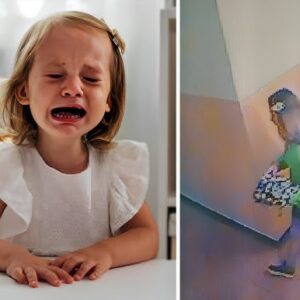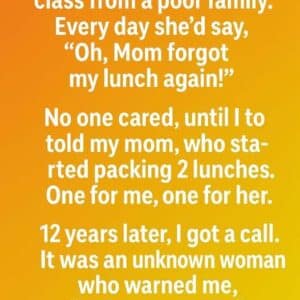I thought forty years in a classroom had shown me every possible version of human behavior. I’d taught angels and terrors, liars and truth-tellers, the heartbreakingly kind and the casually cruel. I really believed nothing could surprise me anymore.
Then my son married Diane.
She’s the sort of woman who shares “Be Kind” quotes with soft sunsets and butterflies on social media, then snaps at waitresses for not refilling her water fast enough. She sends back online orders because the cardboard box has a crease. She once complained that the ice in her glass was “too loud.”
When Thomas first brought her over three years ago, I smiled my practiced, polite smile and kept my mouth shut. A mother learns when to speak and when to watch. And at the time, we were all still raw.
We’d lost Sarah—my first daughter-in-law, and as dear to me as any blood relative—to cancer not long before. She was sunshine in human form, the kind of woman who made holidays feel like magic and Tuesdays feel important. Her death hollowed the house out, but nobody suffered like my granddaughter, Ellie.
Ellie was thirteen, all long limbs and fragile bravery. I watched her move through that grief with a quiet strength that made my chest ache. Standing beside her at Sarah’s funeral, listening to the hollow scrape of the coffin being lowered, I promised myself one thing: I would not let anyone, ever, dim that child’s light. Not as long as I could still stand upright.
Diane? At best, she tolerated Ellie. When Thomas was in the room, she managed a brittle sort of politeness. When he wasn’t, the mask slipped and I saw the irritation, the impatience. I kept my distance and counted my silences as self-control.
Then, one cold evening in November, Ellie knocked on my door with her sketchbook clutched to her chest and fire in her eyes.
“Grandma,” she said, without even sitting down first, “I want to make a hundred blankets for people who sleep outside. So they won’t freeze this winter.”
“A hundred?” I repeated, trying not to laugh in surprise.
She nodded, curls bouncing. “I’ve been learning how to sew on YouTube. I’ve practiced on old t-shirts. I can do it. But I’ll need help. Will you help me?”
There are moments in life when the only possible answer is yes.
We turned my little living room into what looked like the inside of a fabric store hit by a tornado. Bolts and scraps in every color piled on the sofa. Pins in old teacups. Thread tangling around chair legs. It was chaos, the lovely kind.
Sometimes we worked in companionable silence, the TV murmuring in the background while scissors whispered through cloth. Other times, Ellie would talk about school, her friends, or nothing at all, just letting the hum of our shared project fill the space where grief had lived.
One afternoon, she paused with a square of pale blue fleece in her lap, fingers stroking it like it was something alive.
“Mom had a scarf this color,” she said quietly. “It smelled like cinnamon gum. She used to wrap it around me when we waited for the bus, so I wouldn’t get cold.”
Her voice wobbled on that last word. Children try so hard to be brave, but they don’t have the armor adults build up over the years. I set my needle down and opened my arms.
“Come here, sweetheart.”
She leaned into me, face pressed against my shoulder.
“Your mom would be bursting with pride right now,” I told her. “She believed in taking care of people who were hurting. You’re carrying that forward.”
Ellie sniffed and wiped her eyes on her sleeve. “That’s why I want them to be perfect,” she said. “So when someone gets one, they feel like… like they’re wrapped in love. Like I did when she wrapped her scarf around me.”
If my heart could have broken twice, it would have.
Every weekend, Ellie showed up with her backpack stuffed full of fabric from classmates—old curtains, worn-out sheets, clothes they’d outgrown. Soon my coffee table disappeared under a mountain of color. It looked like a rainbow had exploded and chosen my house as its landing zone.
She added one special touch: a tiny heart hand-stitched into the corner of every blanket. Red on navy, yellow on brown, white on black.
“That’s so they know someone loves them,” she explained matter-of-factly. “Even if they’re alone, they’ll know somebody made this just for them.”
I had to turn away and pretend to adjust the lamp, because I could feel tears thickening my throat.
Not everyone was moved.
Whenever Diane stopped by and saw the stacks of blankets and boxes lining my hallway, her face pinched like she’d smelled something sour.
“Ellie, this isn’t a charity warehouse,” she would say. “This is supposed to be a home. You’re turning it into a junkyard.”
Another time, she sniffed and added, “Maybe you should spend this much effort cleaning your own room. Charity starts at home.”
I bit my tongue until I tasted blood. You don’t wrestle with pigs, as my own grandmother used to say. You both get dirty and the pig likes it.
The real breaking point came in early December.
Thomas called one afternoon. “Mom, I have to fly to Seattle for a last-minute business trip. Three days, maybe four.”
“I’ll check on Ellie every day,” I said immediately. “Make sure she’s okay.”
In the background, I heard Diane’s voice, cool and sharp. “That’s not necessary. I’m perfectly capable of looking after my stepdaughter.”
My instincts prickled, but I forced myself to trust that basic decency would win out.
I should have listened to my instincts.
Two days later, at 4:30 p.m., my phone rang. When I answered, all I heard at first was sobbing—raw, gasping, gut-deep sobbing.
“Grandma,” Ellie choked out. “They’re gone. All of them. My blankets—everything’s gone!”
The room spun for half a second. “Stay where you are,” I told her. “I’m coming.”
I drove faster than I’ve driven in years, hands tight on the wheel, my heart hammering like it wanted out of my chest.
When I got there, Ellie led me straight to the garage. It had been filled with neatly labeled boxes: “Blankets 1–20,” “21–40,” and so on. I’d helped her stack them. We were at ninety-seven finished.
Now the shelves were bare. Just dust and the faint rectangles where cardboard had pressed against wood.
I found Diane in the kitchen, leaning against the island with a glass of white wine, scrolling her phone without a care in the world.
“What happened to the blankets?” I asked, my voice coming out low and flat.
She looked up, perfectly calm. “Oh, that,” she said, waving her hand. “They were taking up half the garage. Just junk, really. Old scraps and trash. I cleaned everything out. You’re welcome.”
It took me a second to process the words.
“You… threw them away?”
She rolled her eyes. “Margaret, they were made from old rags. Do you really think homeless people want patchwork trash? They were never going to be used. I actually saved everyone time and space.”
Behind me, I heard Ellie suck in a sharp breath and then flee down the hall, a small, broken sound escaping her as she went.
I looked at Diane. Really looked. At her expensive blouse, her manicured nails, her carefully glossed lips forming such careless cruelty.
“You threw away her work,” I said quietly. “You threw away her kindness.”
“Kindness doesn’t pay the bills,” she replied, sipping her wine. “Maybe now she’ll focus on something useful. Coding, perhaps. Math. A skill that actually matters.”
I wanted to scream at her. To take the glass from her hand and hurl it against the wall. Instead, I inhaled slowly, then did something that clearly unsettled her more than shouting would have.
I smiled.
“You’re right,” I said lightly. “It is definitely time someone learned a lesson.”
That night, I drove out to the city dump.
The sky was black velvet and the air bit through my coat like teeth. Harsh lamps buzzed overhead, casting sickly yellow patches on heaps of trash. It smelled like rot and chemicals and rain-soaked cardboard.
I should not have been there. A sixty-eight-year-old woman, alone, climbing over piles of discarded lives. But anger has its own fuel.
I searched. I waded through bags and broken furniture, through torn boxes and soggy newspapers. My fingers went numb. My shoes squelched in something I didn’t want to identify.
Then I saw it: a corner of blue fleece, stained but unmistakable. I pulled it out with shaking hands.
There, just where Ellie had stitched it, was the tiny red heart.
“I’ve got you,” I whispered, voice cracking.
I kept going. Blanket after blanket emerged from the chaos—dirty, crumpled, but still here. Still real. I didn’t stop until my trunk was full and my back screamed in protest.
Back home, I washed and dried them, one load after another, until my small house looked like someone had hung the sky and every sunset inside it. The next morning, I started making phone calls.
Retired teachers have two great assets: time, and long memories. I called former colleagues, church friends, people from the community center, parents who had once trusted me with their children. I called in every favor I had ever earned simply by being there for people for four decades.
“We’re organizing something special on Sunday,” I told them. “Come if you can. Bring your hearts. And maybe your cameras.”
Then, when my little army was mobilized, I called Diane.
“We’re having a family dinner on Sunday,” I said sweetly. “You’ve been working so hard lately. I thought it was time we showed you how much the community appreciates everything you do.”
I could almost hear her preening through the phone. “Well,” she said, “it’s about time.”
On Sunday evening, she arrived at my house in heels and a dress better suited for a charity gala than a family meal. The living room, as she quickly noticed, was empty.
“Where is everyone?” she asked.
“Oh, we’re just across the street,” I told her, helping her into a coat. “At the community hall. Come on.”
The moment we stepped inside, I felt the air change.
The hall buzzed with warmth and noise. People filled every corner—neighbors, former students, teachers, church members, volunteers from local shelters. There were folding tables covered in food donations, big pots of soup, trays of rolls. Reporters from the local paper mingled with camera crews. And right there in the middle of it all, talking to our mayor, was Ellie.
She wore her mother’s old Christmas sweater, slightly too big, sleeves pushed up. Her cheeks were pink with nerves and joy.
Along the walls, draped over chairs and hung from lines, were blankets. All of them. Every last one we had saved. Clean, bright, and beautiful. A riot of color under the fluorescent lights.
Across the back wall, in big bold letters, a banner read:
“100 BLANKETS OF HOPE – HANDMADE BY A 13-YEAR-OLD GIRL WHO BELIEVES IN KINDNESS.”
I felt Diane’s arm tense under my hand.
“What is this?” she whispered.
“It’s your stepdaughter’s work,” I said gently. “Look how it shines when people don’t throw it away.”
A reporter caught sight of us and hurried over, beaming.
“You must be so proud of Ellie!” she said to Diane. “What an incredible young woman you’re raising.”
I almost felt sorry for her in that moment. Almost.
Diane opened her mouth, closed it, and managed a strangled, “Yes, of course, very proud…”
Ellie walked over, eyes bright but steady. She looked from me to Diane and then at the reporter.
“It’s okay that she threw them out,” Ellie said, voice clear enough to carry. “Grandma says sometimes people throw away things they don’t understand. It doesn’t mean those things aren’t precious.”
The room fell strangely quiet after that. It’s funny how fast energy can shift when truth enters the space.
Diane stood frozen, a faint tremor starting in her hand.
I leaned in and murmured, “Relax. I didn’t mention any names at the dump, or here. People can connect their own dots if they want to. Consider this mercy.”
Her eyes flicked around the room—at the blankets, the banner, the mayor shaking Ellie’s hand, the cameras capturing everything. Then she turned and fled, heels clattering on the linoleum.
Two days later, Thomas returned from Seattle to find his daughter on the front page of the local paper under the headline:
“LOCAL TEEN WARMS COMMUNITY WITH HANDMADE BLANKETS AFTER CRUEL SETBACK.”
He called me the moment he saw it.
“Mom,” he said tightly, “what setback?”
So I told him. All of it. The garage. The dump. The event.
There was a long silence on the line. Then he said, “I’ll call you later,” and hung up.
That evening, he packed Diane’s things into cardboard boxes. When she tried to spin a story about “miscommunication,” he didn’t raise his voice. He just pointed to the door and told her this house would never again be a place where his child’s kindness was treated like trash.
He also insisted she reimburse the cost of the materials she had destroyed. Every cent went into Ellie’s next project: organizing a Christmas Eve dinner for homeless families at the same community hall.
That night, I sat beside my granddaughter as she handed out plates piled high with warm food and later, blankets she had made with her own two hands. She chatted with little kids, laughed with tired mothers, stood patiently while an old veteran told her a story he’d probably told a hundred times.
“Grandma,” she whispered at one point, fingers squeezing mine, “I think this is what Christmas is supposed to feel like.”
I looked at her face, lit softly by fairy lights and kindness, and felt my heart swell.
“Yes, darling,” I said. “And I want you to remember something for the rest of your life.”
She looked up at me, waiting.
“Even when someone throws your kindness in the trash,” I told her, “you can still turn it into light. As long as you don’t let them convince you it was garbage.”
Ellie smiled then—really smiled, the way she used to before hospitals and funerals and stepmothers who couldn’t recognize gold when they saw it.
That Christmas was one of the best I’ve ever had. Not because everything was perfect, but because, in one cold hall filled with strangers and blankets and second chances, I watched my granddaughter choose compassion over bitterness.
And I knew, with complete certainty, that no one would ever dim her light. Not on my watch.





